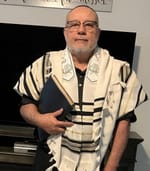Matthew 28:19; Spurious?

Understanding the Claim
The word spurious means lacking authenticity or validity in essence or origin; not genuine. In other words, it refers to something dubious or fallacious.
In most Bibles, Mattityahu [Matthew] 28:19 reads:
“...baptizing them in the name of the Father, and of the Son, and of the Holy Spirit.”
These words—commonly called the Trinitarian formula—are considered by some to be a later addition to Scripture. This conclusion is not based on surviving manuscripts, for all extant Greek copies of Matthew include these words. However, the oldest substantial fragments of Matthew date only from the 4th century onward, leaving a long period with no direct textual witness.
Because of this, some scholars and believers have examined internal and historical evidence that seems to indicate these words were not part of the original Gospel but were added in the early 4th century.
Early Historical Evidence
One of the most compelling pieces of evidence comes from Eusebius of Caesarea, a 4th-century bishop, historian, and participant in the Council of Nicaea (325 CE).
Between 300 CE and 336 CE, Eusebius quoted Matthew 28:19 a total of eighteen times. In all his earlier quotations, he cited it as:
“Go ye and make disciples of all nations in My Name, teaching them to observe all things whatsoever I commanded you.”
Notably, these early quotations lack both a reference to baptism and the Trinitarian formula. Only after the Council of Nicaea—where the Trinity doctrine was formally established—did Eusebius begin quoting the verse in its expanded form:
“...baptizing them in the name of the Father, and of the Son, and of the Holy Spirit.”
Given Eusebius’s prominence as a Church historian and his close relationship with Emperor Constantine, some researchers believe he may have directly or indirectly contributed to the adoption or promotion of this expanded reading. His influence, combined with the theological agenda of the post-Nicene Church, could have facilitated the integration of this formula into later copies of Matthew.
Parallel Accounts in Scripture
The strongest internal evidence comes from other Scriptural accounts of the same event—Y’hoshua’s post-resurrection commission to His talmidim.
1. Luke 24:47
“And that repentance and forgiveness of sins is to be proclaimed in His Name to all nations, beginning at Yerushalayim.”
(CJB)
Here, there is no mention of baptism, nor any Trinitarian formula—only proclamation and repentance in His Name.
2. Acts 1:8
“But you will receive power when the Ruach HaKodesh comes upon you; and you will be My witnesses both in Yerushalayim, in all Yehudah and Shomron, and to the ends of the earth.”
(CJB)
Again, no mention of baptism or a formula.
If the Trinitarian words were truly the essential command of Y’hoshua, it would be extraordinary for Luke—who recorded both these passages—not to mention them at all.
The Testimony of Acts
Every recorded instance of baptism in the book of Acts is done in the Name of Y’hoshua HaMashiach—never with a Trinitarian formula:
- Acts 2:38 – “Repent, and let each one of you be immersed in the Name of Y’hoshua the Messiah for the forgiveness of sins...” (TS2009)
- Acts 8:16 – “They had only been immersed in the Name of the Master Y’hoshua.”
- Acts 10:48 – “And he commanded them to be immersed in the Name of Y’hoshua the Messiah.”
- Acts 19:5 – “When they heard this, they were immersed in the Name of the Master Y’hoshua.”
Even Sha’ul (Paul) confirms:
“Or do you not know that as many of us as were immersed into Y’hoshua HaMashiach were immersed into His death?”
(Romiyim [Romans] 6:3, TS2009)
“For as many of you as were immersed into the Messiah have put on the Messiah.”
(Galatim [Galatians] 3:27, TS2009)
In every case, immersion was performed solely in the Name of Y’hoshua HaMashiach.
Why This Matters
This issue is not merely academic—it touches the heart of how the early assembly (ekklesia) understood the authority of Y’hoshua.
He said:
“All authority in heaven and on earth has been given to Me.”
(Mattityahu [Matthew] 28:18, TS2009)
If He holds all authority, then immersion in His Name alone fulfills the commission. The book of Acts demonstrates this consistent practice.
Furthermore, the phrase “in the name of the Father, Son, and Holy Spirit” reflects later theological development—aligning with 4th-century Trinitarian definitions rather than 1st-century Hebraic understanding.
It’s worth noting that another famous addition, the Comma Johanneum (1 Yochanan [1 John] 5:7–8), which explicitly names the Father, Word, and Holy Spirit as “one,” was also inserted in later Latin manuscripts—showing a pattern of Trinitarian editing during and after the Nicene period.
In the Name of Y’hoshua Alone
The renewed covenant Scriptures teach one consistent message: salvation and immersion are found in the Name of Y’hoshua HaMashiach.
“There is no other Name under heaven given among men by which we must be saved.”
(Ma’asei [Acts] 4:12, CJB)
When we are immersed in His Name, we identify with His death, burial, and resurrection. To call upon Y’hoshua’s Name is to call upon Y’hovah’s salvation, for His Name literally means “Y’hovah saves.”
Restoring this understanding is not about condemning those who use traditional formulas, but about returning to the authentic practice of the first-century talmidim.
Conclusion
While textual evidence cannot prove definitively that the Trinitarian formula in Matthew 28:19 was added later, the historical, internal, and contextual indicators strongly suggest it. The earliest believers, the writings of Acts, and the testimony of early quotations all confirm that immersion was performed in the Name of Y’hoshua HaMashiach alone.
To follow His true command is to walk in the revelation of who He is—the embodiment of Y’hovah’s salvation.
“Whatever you do, in word or deed, do all in the Name of the Master Y’hoshua, giving thanks to Elohim the Father through Him.”
(Qolasim [Colossians] 3:17, TS2009)
By Rabbi Francisco Arbas — Netzari Mashiach Judaism
www.netzarim-talmidim.org

Comments ()